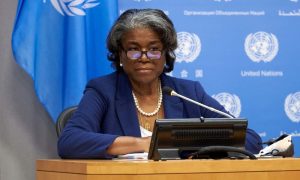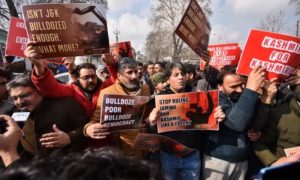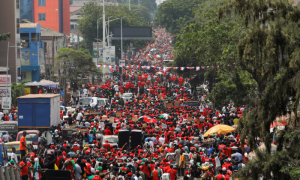WASHINGTON: The White House insisted on Wednesday that Israel and Hamas are still close to a ceasefire deal, despite growing fears of a broader regional war following the assassination of Hamas leader Ismail Haniyeh in an alleged Israeli strike in Tehran last week.
US National Security Council spokesman John Kirby said that the United States is engaged in “intense diplomacy” to secure a ceasefire deal for Gaza and to facilitate the release of hostages held by Hamas. Kirby asserted that the US believes it is “as close as we think we have ever been” to finalizing the agreement.
The diplomatic efforts come amid growing fears of a broader regional conflict following Ismail Haniyeh’s assassination in Tehran. Iran has vowed retaliation for Haniyeh’s killing. The Revolutionary Guards reported that Haniyeh was struck by a “short-range projectile” fired from outside his accommodation. Both Iran and Hamas have accused Israel of orchestrating the attack.
Meanwhile, Hamas has appointed Yahya Sinwar as its new leader. Sinwar is believed to be the mastermind behind the October 7 attack on Israel, raising concerns that the ceasefire negotiations could become even more challenging.
The White House has previously indicated that a ceasefire deal was “close” and has urged both Israel and Hamas to agree to the proposed terms, which include an initial six-week truce. On Tuesday, President Joe Biden spoke with the leaders of Qatar and Egypt, emphasizing that negotiations had reached a “final stage”.
In response to the increasing threat of regional war, the United States has deployed additional military assets, including planes and warships, to the area to support and defend Israel if necessary.
US Secretary of State Antony Blinken also reiterated calls for restraint, urging both Iran and Israel to avoid further escalation. While Kirby declined to discuss specific intelligence assessments regarding potential actions by Iran and Lebanon’s Hezbollah, he emphasized ongoing diplomatic efforts to stabilize the situation.
Meanwhile, in a phone conversation with French President Emmanuel Macron, Iranian President Masoud Pezeshkian called on the United States and other Western countries to cease their support for Israel.
Pezeshkian condemned Western arms sales and support for Israel, describing it as backing a regime that disregards international laws. “If the United States and Western countries want to prevent war and insecurity in the region, they should immediately stop selling arms and supporting the Zionist regime,” Pezeshkian stated.
Pezeshkian emphasized Iran’s commitment to avoiding war and promoting global peace, yet underscored the nation’s resolve to defend its interests and security. “The Islamic Republic of Iran considers avoiding war and trying to establish world peace and security as one of its basic principles,” he said. However, he warned that Iran would not remain silent against violations of its interests.
The assassination of Haniyeh, a key figure in ceasefire negotiations, has exacerbated concerns about the future of peace efforts and regional stability. In his conversation with Macron, Pezeshkian urged Western nations to pressure Israel to cease its attacks on Gaza and accept a ceasefire. Iran has called for an end to the ongoing Israeli violence.























